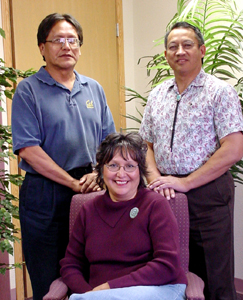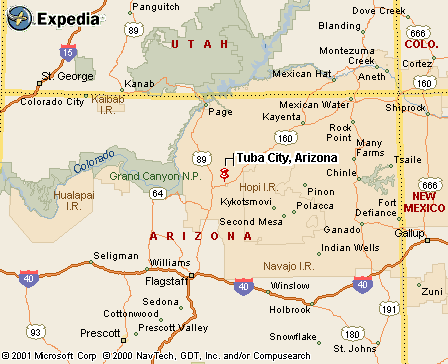|
|
Canku Ota |
|
|
(Many Paths) |
||
|
An Online Newsletter Celebrating Native America |
||
|
January 10, 2004 - Issue 104 |
||
|
|
||
|
New doctor in the house at Tuba City District |
||
|
by Rosanda Suetopka Thayer
- Tuba City District Media
|
||
|
TUBA CITY — There is no doubt about it, earning a doctoral degree is tough and can take more years than originally planned. But a canvass of those who have put forth the effort indicates it's well worth the sacrifice, stress and patience to earn the right to be called "Doctor."
One if the other two is TCUSD Superintendent Dr. Hector Tahu, who is full blooded Maori from New Zealand and has lived in Arizona on the reservation for more than 25 years. Dr. Tahu has an avid interest in culture and language for all indigenous peoples and advocates for these programs at the district. The third is Associate Superintendent Dr. Harold G. Begay, who is full-blooded Navajo, a native of Tuba City who is noted for his work in both Gifted and Talented Education and the specialized field of neuro-science. Both Dr. Tahu and Dr. Begay have been recognized both state and nationally for their efforts towards betterment of Native American education and language. Dr. Keith, who received her doctorate in education currently serves as the Foundation Officer for Tuba City District. She offered insight to Native American students who are seeking higher educational goals and personal advice to help make that path a little easier. Dr. Keith had several reflective stories laced with quite a bit of humor. "The most important factor in my educational achievement and professional accomplishment has been my family and relatives, "ke,'" she said. "My father was my role model. My brothers and sisters were my greatest supporters. My mother and grandmother provided spiritual support. My children and husband have been my inspiration. They served as my source of strength when I faced challenges and difficult times." She
discussed her Native American heritage. "I have six brothers and three sisters; I am the youngest girl. We were raised in a one-room house with a wood stove, no running water or electricity. We all helped with farming and shepherding responsibilities." Keith said her grandmother always reminded her to know herself—that she belongs to a tribe who has a distinct culture, language and practices. "This will serve as your main source of strength and renewal," she said. "You will turn to the prayers and the traditional practices when barriers and obstacles become daunting." "If someone tries to tell you that your language and culture is a handicap or extra baggage, this is not true." Keith stressed the importance of being able to speak her native tongue. "My ability to speak Navajo has allowed me to tell and listen to jokes in Navajo," she said. "We all know that jokes lose their humor when translated." "Humor is important to relieving stress. I was also able to use my first language in saying my prayers, a practice that was critical to keeping my spiritual balance." Keith
moved on to discuss higher education. "It took me four years with a one-year break to finish my bachelor degree but it took another nine years to get my masters degree. My doctoral program took me five years." She explained that her situation was different each time. "After my second year of college, I left for a year because I had a baby and my father passed away," Keith said. "With the help of my family, I returned to Arizona State University. To get done in two years, I took 18 credit hours and worked, too, to support myself and my little son." "During my last semester, I carried 21 hours, completed my internship and worked 20 hours a week." But she said she stayed focused on her goal: graduation. "On my commencement day, my four-year-old and two-year-old sons celebrated with my entire family the first family member to graduate from college, Keith said. "My graduate program took longer, because I worked fulltime and had to attend classes only on weekends. I also didn't take classes every semester, so it took longer." She said the most intimidating aspect of the graduate program was the comprehensive examination. "I studied hard for the four-hour written exam," Keith said. "My reading, writing and analytical skills were keys to my research and written examinations." "My family played a significant role in the data analysis and interpretation. Like [they were for] my bachelor's degree, my brothers and sisters continued to be an important facet in completing my doctoral program." Between 1984 and 2003, Keith worked at Northern Arizona University. "I have seen students with outstanding high school academic records leave," she said. "At the same time, I have seen students with average grades and test scores, complete their degree program. "In speaking and working with Native American students, they had one thing in common. They stayed focused on the end goal." She
stressed their determination. "They brought their families or left their children with relatives. Nonetheless, they overcame these challenges because they insisted on remaining focused and looked to their families and relatives like all Natives do for support, there is enormous strength in your family." Dr. Keith had advice for native students who receive their degrees that still focused on Native American values and ethics. "Another lesson is to give back to your family," Keith said. "A college education and professional career are not reasons to abandon your family." "It does not necessary mean you have to move home. But it does mean that you must contribute and assist your family." For Keith personally, she said it means helping her nieces and nephews while they attend college. "I must now help the next generation of college students," she said. "I hope that by sharing a little bit of my own experience, you will know that with hard work and always, always, that focus and remaining true to your own tribal heritage and values, you can complete a bachelor, masters and doctoral program." "Remember I come from a family of sheepherders. I am the little girl with the simple Navajo outfit who got her pictures taken by tourists in Canyon De Chelly. I am still that girl—one who is grounded first in traditional values and language." Doctors Tahu, Begay and Keith are full-time employees of Tuba City District, which is now categorized as the largest Native American School district in northern Arizona that holds the record for the most natives in their employ with master's degrees. For more information about Tuba City District and its opportunities for both student and staff, contact Rosanda Suetopka Thayer, Public Relations, phone 928-283-1072. (Rosanda Suetopka Thayer is Public Relations Director for Tuba City Unified School District.) |
|
|
www.expedia.com |
|
|
||
|
|
||
| Canku Ota is a free Newsletter celebrating Native America, its traditions and accomplishments . We do not provide subscriber or visitor names to anyone. Some articles presented in Canku Ota may contain copyright material. We have received appropriate permissions for republishing any articles. Material appearing here is distributed without profit or monetary gain to those who have expressed an interest. This is in accordance with Title 17 U.S.C. Section 107. | ||
|
Canku Ota is a copyright © 2000, 2001, 2002, 2003, 2004 of Vicki Lockard and Paul Barry. |
||
 |
 |
|
|
The "Canku Ota - A Newsletter Celebrating Native America" web site and its design is the |
||
|
Copyright © 1999, 2000, 2001, 2002, 2003, 2004 of Paul C. Barry. |
||
|
All Rights Reserved. |
||
 Dr.
Tanya Gorman Keith is now one of three people at Tuba City Unified
School District #15, who has earned this honor after receiving her
degree this past month from Northern Arizona University in Flagstaff.
Dr.
Tanya Gorman Keith is now one of three people at Tuba City Unified
School District #15, who has earned this honor after receiving her
degree this past month from Northern Arizona University in Flagstaff.